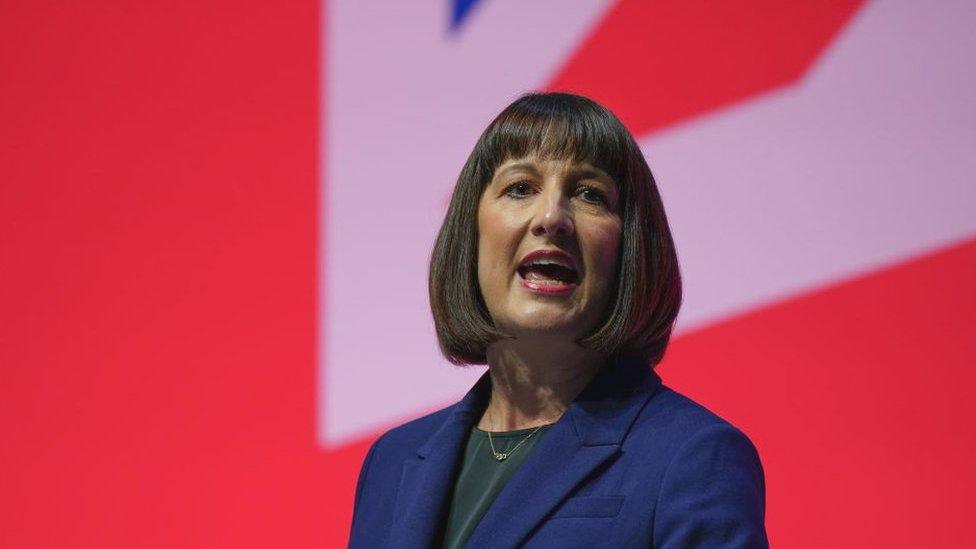Bankers' bonuses: No cap under Labour, says Reeves
- Published
- comments

The shadow chancellor has told the BBC Labour would not reinstate a bankers' bonus cap that was scrapped last year by the Conservative government.
It comes as Rachel Reeves set out Labour's plans to boost economic growth through the financial services sector.
She described the sector as one of the UK's greatest assets which the party would "unashamedly champion".
It marks a big change from the policies of the previous leadership and past criticism of the bonus cap removal.
A maximum bonus, equivalent to 200% of bankers' regular pay, was introduced across the European Union (EU) to deter the excessive risk-taking many blamed for the financial crisis.
The decision to abandon the bonus cap was made by the short-lived Liz Truss government before turmoil on the financial markets forced her chancellor Mr Kwarteng to step down, followed by the prime minister herself.
Ms Reeves, shadow chancellor and a former Bank of England official, told the BBC that she had no plans to reinstate the bonus cap despite criticism from key Labour figures and others, including the umbrella body for the UK's trade unions.
"The cap on bankers' bonuses was brought in in the aftermath of the global financial crisis and that was the right thing to do to rebuild the public finances," she said.
"But that has gone now and we don't have any intention of bringing that back. And as chancellor of the exchequer, I would want to be a champion of a successful and thriving financial services industry in the UK."
However, as recently as October 2023, she wrote a post on X, formerly known as Twitter, questioning why the cap was being removed, contrasting the move with the challenges facing ordinary households.
Allow X content?
This article contains content provided by X. We ask for your permission before anything is loaded, as they may be using cookies and other technologies. You may want to read X’s cookie policy, external and privacy policy, external before accepting. To view this content choose ‘accept and continue’.
Labour leader Sir Keir Starmer also criticised the policy and said it amounted to "pay rises for bankers, pay cuts for district nurses" against a backdrop of industrial action in the health sector.
Momentum, a left-wing campaign group, described Ms Reeves's most recent remarks as "totally out of touch" with Labour's values and public opinion.
It said that Sir Keir and Ms Reeves seemed "determined to repeat" failures seen around the financial crisis.
Many see the cap as a means to hold down overall pay for City bankers.
However, over the last decade, UK banks have compensated for lower bonuses by increasing bankers' basic salaries to ensure they could still compete in attracting top talent with other top financial centres like New York and Singapore.
Critics of the cap say at least bonuses can be deferred or clawed back depending on performance, while basic salaries cannot.
Sceptics include the Bank of England's governor, who previously told the BBC allowing uncapped bonuses was preferable because it didn't lead to "upward creep of permanent pay" in the sector.
Labour has been on a charm offensive with business and finance for some time and this latest announcement comes ahead of a major conference for business leaders in London hosted by Labour on Thursday.
Ms Reeves outlined a raft of Labour's policies towards the financial sector including:
Forging closer ties with the EU
Expanding finance centres outside London and Edinburgh
Streamlining regulation
Boosting pension investment in UK companies and green technologies
Exploring longer-term fixed rate mortgages
Many of Labour's ideas to scrap burdensome regulation are remarkably similar to recent government initiatives to keep up with new emerging technologies and other global financial centres.
But in an election year, this announcement is a deliberate shift to demonstrate Labour has changed from 2019 when Jeremy Corbyn and John McDonnell supported the nationalisation of some industries and described City bankers as overpaid "speculators".
Miles Celic, chief executive of financial services body TheCityUK, said: "Labour has set out a forward-thinking plan for financial services with a clear focus on innovation, modernising the regulatory landscape, driving more investment, and unlocking growth in the wider economy."
However, there are some in the industry who are uncomfortable with the direction Labour is taking.
Mick McAteer, co-director of the Financial Inclusion Centre and a former board member of the Financial Conduct Authority, suggested the party was "going too far".
"It seems to have forgotten the mistakes of the previous Labour administration which allowed finance to become too dominant, leaving the UK one of the most exposed global economies when the devastating 2008 crisis came.
"Ordinary people and the UK's public services are still paying the price for that failure," he said.
"The City finance lobbies are very vocal at promoting the benefits of the sector. The City doesn't need another champion in Labour," Mr McAteer added.
The Conservative government has attacked Labour's financial credibility with the public finances and its pledge to bring down government borrowing as a percentage of national income over the next parliament.
Prime Minister Rishi Sunak has singled out Labour's 2021 pledge to invest £28bn a year in green technologies as being unachievable without higher taxes and borrowing.
That pledge has been watered down by shadow business secretary Jonathan Reynolds to "an ambition" and Ms Reeves has said Labour's spending plans would have to adjust to the situation it would inherit if it wins.
The Conservative Party has dropped heavy hints it will use any spare money in the public kitty to cut taxes - something Ms Reeves has described as a "scorched earth" approach.
Related topics
- Published31 October 2023

- Published17 January 2024
